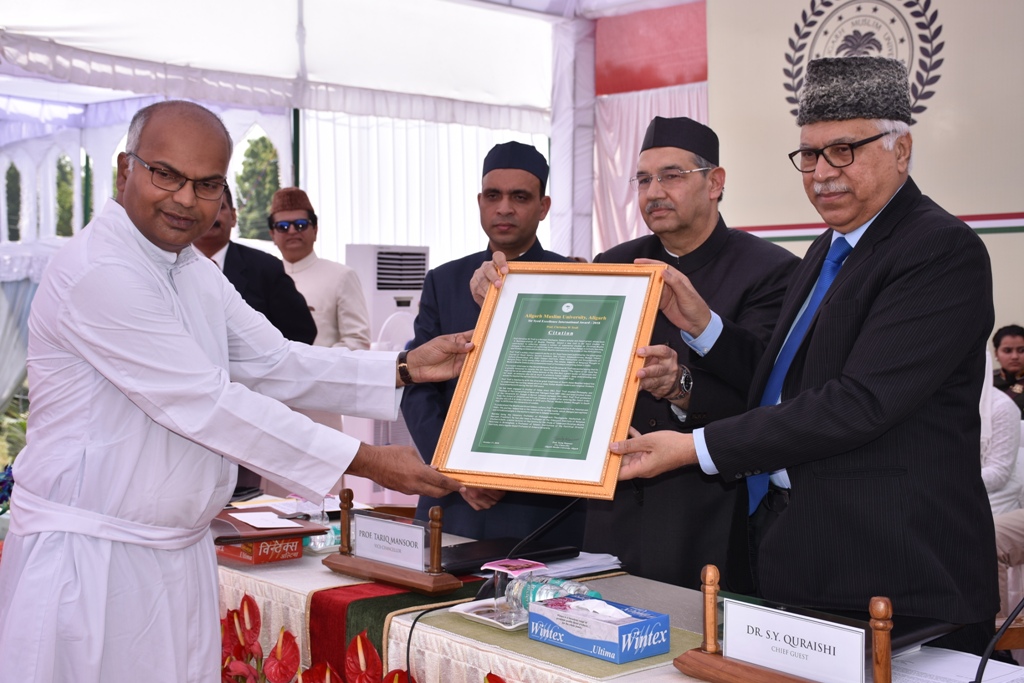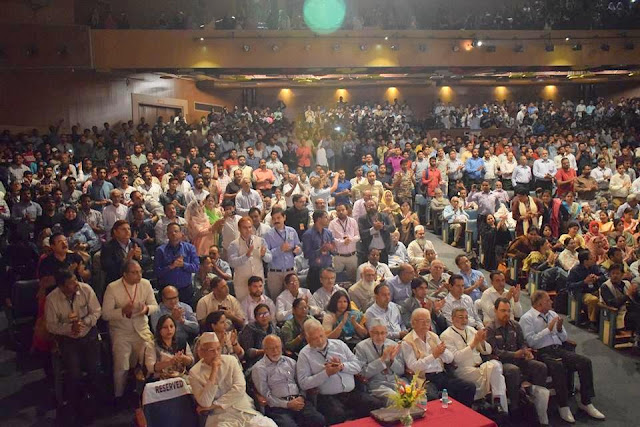It was a nostalgia occasion for hundreds of Aligarh
Muslim University alumni and AMU fraternity, to attend the AMU celebration of
Sir Syed Dy.2018.They assembled again in a huge pandal .constructed at Athletic
ground of Chaman-E-Syed to connect with each other to refresh their old
memories.
For
AMU Fraternity all over word this day i,e 17th October is not an ordinary day of the year. For them It is
above many festivals.They celebrate Sir syed day in full sprit. After sun set
,all the main buildings specially,Bab-e-Syed,Maulana Azad Libray,Arts Faculty, Victoria gate ,University’s grand Masjid and residential halls are
well decorated with special light effects.
People of all ages use to roam in campus, special to mention that young students use to run on their motor cycles to show breath taking stunts.
Earlier in the day, AMU Vice Chancellor, Prof Mansoor inaugurated an 'Exhibition of Books and Photographs pertaining on Sir Syed Ahmad Khan' at the Sir Syed House. The exhibition was jointly organised by Maulana Azad Library and Sir Syed Academy.
Main function of Sir Syed Day was started
in pandal at Athletic ground by recitation of Holy quran Shareef. Chief guest
of Sir Syed Day 2018 was Former Chief Election Commissioner of India, Dr S Y Quraishi.
Dr S
Y Quraishi today delivered the commemoration address as the chief guest on Sir
Syed Day, the 201st birth anniversary of Aligarh Muslim University (AMU)
founder, Sir Syed Ahmad Khan at the University's Athletics Ground.
"Sir
Syed initiated English education and scientific temper among Indians, which
made us world citizens. Sir Syed's message was not anti-Islam and among his
admires were equal number of non-Muslims and Muslims," said Dr S Y
Quraishi.Dr Quraishi pointed out that during his trips to US, European countries, African countries and West-Asia, he always met AMU alumni, which is reflective of the famous line from AMU anthem, 'Jo abr yahaṅ se utthega, wo sarey jahan par barsega' (The cloud which rises from here, will rain all over the world).
In
the welcome address, AMU Vice Chancellor, Professor Tariq Mansoor said that Sir
Syed changed the destiny of the nation by devoting his entire life for
education, plurality and secularism through his versatile writing and
farsightedness.
Prof
Mansoor pointed out that the supreme interest of Sir Syed's life was education
in its widest sense as he wanted to create a scientific temperament among the
common Indians.
"There
are positive changes and developments in AMU with active cooperation of all
concerned," said the Vice Chancellor adding that Times Higher Education
has ranked AMU as the fifth best Indian University, while National Institute
Ranking Framework (NIRF) has ranked AMU as the 10th best Indian university.
"AMU
has started new courses such as Masters in Architecture, B Voc (Hons) and M
Voc. We are in the process of starting a MBA course in Hospital
Management," he said adding that the University has also increased courses
running through the distance learning mode which includes a Bachelor in
Computer Sciences.
Dr S
Y Quraishi and Professor Mansoor honored Professor Christian W Troll (Noted
theologian and Honorary Professor for the Study of Islam and Christian-Muslim
Relations at the Philosophisch-Theologische Hochschule St. Georgen in
Frankfurt).Dr
Victor Edwin received a cash prize of Rs two lakhs with a citation on behalf of
Professor Christian W Troll who could not travel to India due to health
problems.
and Mr Sanjiv Saraf (Founder, Rekhta Foundation) with the
International and National Sir Syed Excellence Awards respectively.Meanwhile,
receiving a cash prize of Rs one lakh and citation for the National Sir Syed Excellence
Award, Mr Sanjiv Saraf said, "We, the lovers of Urdu language, take great
pride in how this language conveys complex emotions and experiences." He
pointed out that Rekhta is an initiative, which targets to bring Urdu's
charming cadence in dimensions of poetry, aesthetics, and tradition to the
masses.
The
top three winners of the 'All India Essay Writing Competition' on the topic of
"Importance of Sir Syed Ahmad Khan's Thought on Tolerance and Peaceful
Coexistence in Today's World" also received their prizes from the Chief
Guest and the Vice Chancellor.
With
a cash prize of Rs 25,000, Ms Jagriti Sanghi, a BALLB student at the National
University of Advanced Legal Studies, Kochi, Kerala bagged the first prize
while Mr Mohd Umair Khan, student of MA Economics at Aligarh Muslim University,
Aligarh won the second place with a cash prize of Rs 15,000.
Ms Kiran Francis, student of M Phil (Applied Geology), University of Madras, Chennai, Tamil Nadu has emerged third with a prize of Rs 10,000.
Ms Kiran Francis, student of M Phil (Applied Geology), University of Madras, Chennai, Tamil Nadu has emerged third with a prize of Rs 10,000.
Fourteen
other participants representing different states have been given State Topper
prizes with prize money Rs 5,000 each.
The programme ended with University Tarana and
National Anthem.Fully packed Pandal at Atheletic ground was burst into clapping
like a thunderbolt.
Ye dasht-e-junoo diwano ka, ye bazm-e-wafa
parwano ki
ye shahr-e-tarab roomano ka, ye khuld-e-barin armano ki
ye shahr-e-tarab roomano ka, ye khuld-e-barin armano ki
Whole day function of Sir Syed Day 2018 was concluded
with a grand dinner in every Halls.
Written, photographed and posted by Engr
Maqbool Akram.





















































